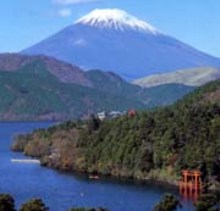International recognition for conservation of sacred natural sites in protected areas
October 17, 2008:
 |
 |
 |
Mount Fuji, with a view of a sacred woodland protected by a Red Torri Gateway. |
Last week the Barcelona IUCN Congress adopted a motion for “Recognition and Conservation of Sacred Natural Sites in Protected Areas” - building on many years of discussions and work by ARC and fellow conservation groups.
The key point of the motion is the award of international status for the protection and conservation of sacred natural sites of indigenous cultures and mainstream faiths.
The IUCN motion opens:
“Recognizing that one of the oldest forms of culture-based conservation has been the protection of the sacred natural sites of indigenous communities and mainstream faiths, and that these sacred natural sites often harbour rich biodiversity and safeguard valuable landscapes and ecosystem”.
To read and download the full text of the IUCN motion, link
here.
"This is the first major international recognition of the partnership possibilities between the major faiths, indigenous peoples and conservation groups concerned with protected areas," said ARC's secretary general Martin Palmer.
The IUCN and UNESCO have now launched "Sacred Natural Sites – Guidelines for Protected Area Managers". The guidelines focus on improving protection of sacred natural sites within and near Protected Areas. "IUCN has become a key player in the effort to protect sacred sites and holy lands of the planet," says Gonzalo Oviedo, IUCN Senior Adviser on Social Policy. "We run projects in the field with custodians of sacred places, we support them at the policy level, we advocate for their recognition and support and we promote better understanding of their values." Link here for more details on the guidelines.
In 1997, ARC launched its Sacred Land project, building on work in China, Mongolia, India and the UK. The project was launched by the Archbishop of Canterbury and its focus was to revive and create sacred sites in Britain and overseas. Its success came through ARC’s work with groups, not individuals. Link here
for more details.
In 2003, with WWF International, ARC proposed to the World Park’s Congress that the term “Sacred Site” should become an international term of protection. 2005 then witnessed the launch of ARC’s publication “Beyond Belief” in association with the WWF and Equilibrium. The report recognised the importance people attached to protecting their sacred lands, linking faiths and protected areas to support biodiversity conservation.
ARC participated in the World Conservation Congress in Barcelona as part of our programme on Sacred Sites with UNDP, Conservation International, WWF International and the World Bank.
Also, as a specific contribution to the growing engagement between mainstream faiths and environmental organisations, ARC launched the “Theology of Land” project this summer, supported by the Christiansen Fund, to work with faiths in defining a Theology of Land. Through this programme ARC hopes to develop a shared platform of concern and action helping to better protect the vast swathes of the world which the major faiths each view as sacred. To do this, we are inviting the major faiths to articulate their own Theology of Land. Link to Theology of Land programme
Links
*** To read the full text of the IUCN motion, link
here.
*** Link here
to read news of IUCN and UNESCO guidelines for sacred sites in protected areas.
*** For details about the use of assets in the ARC-UN 7 Year Plan link here.
*** Link
here for information of ARC and WWF International's Beyond Belief Publication.
*** Link here
for more details of ARC’s Sacred Land Project.
*** Link to ARC's Theology of Land Programme
|

